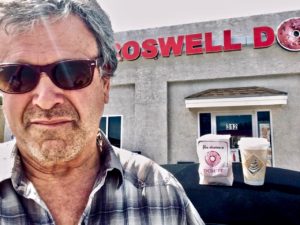
At three and a half hours you could easily fit two different full-length movies into Martin Scorsese’s “The Irishman.” But in some ways that’s what he’s done as he guides us through the highest-profile crime and corruption of America’s last 75 years.
The first two hours of “The Irishman” play like a geriatric re-mix of “Goodfellas”, with the director’s trademark voice-over narration as wise guys are met and whacked. The last 90 minutes though is something far different.
Scorsese settles a pall of guilt and remorse over the story as he assesses the wages of sin on Robert DeNiro’s lead character, mobster Frank Sheeran, as well as the few others that haven’t been dispatched by some edict from “above.”
In our “current moment” it is impossible to sit through “The Irishman” and not have some awareness of how little has changed and how, as the saying today goes, “all roads lead to Putin”, arguably the singular mob boss of our era.
Frank Sheeran’s version of mob and Teamsters Union history since the ’40s, with him as a key player, up to and including the still-unsolved “disappearance” of Jimmy Hoffa is something you take only with a 20-pound block of salt. But the underlying history of modern America — the notorious crime family empires of New York, New Orleans and Chicago — old man Joe Kennedy’s deals with the devils while building his pin-striped, Brahmin empire is all there in the history books. Not that Americans deeply invested in our exceptionally pure and righteous nature ever pay much attention to it.
Scorsese lays out the story of Kennedy tapping his mob “acquaintances” to tip Illinois and the 1960 election to his kid, JFK, as part of an agreement to blow Fidel Castro out of Cuba and reclaim the mob’s lucrative casino operations (and god knows what else). Only things didn’t go as planned.
(Traditional, conventional biographers of the Kennedys regularly claim they can’t verify this sort of coziness with the mob. Never mind JFK canoodling with mob boss Sam Giancana’s special lady friend. But Seymour Hersh was a lot more confident in his sources.)
The Bay of Pigs invasion was a botched farce. The mob not only didn’t get their casinos back, but in an outrageous double-cross, as mob bosses like Giancana and New Orlean’s Carlos Marcello saw it, JFK’s kid brother, attorney general Bobby Kennedy, simultanous with his long-running attack on Hoffa, launched an all-out war on the American mob’s top leadership, to the point of literally grabbing Marcello off the streets of New Orleans and dumping him Guatemala.
Put simply, the mob didn’t take that well.
At a critical point in “The Irishman”, Joe Pesci as middle-tier mob leader Russ Bufalino leans in to De Niro/Sheeran, who is reluctant to accept what has to be done with his friend Hoffa, and says in a whisper, “If they can kill the President of the United States they can kill the president of a union.”
In American mythology the sleazy corruption of goons and goombahs never sets up in the foundational horrors of our history. It’s all been Hollywood-ized. Organized crime characters are just colorful rogues with big, raucous families and a lot of gun-toting enemies. Two plus two never quite equals four. Real world mob corruption and violence is never taken too seriously. Why? Because we’ve been taught by slapdash grade-school history books, cheesey Hollywood melodramas and pulp hagiographies that human nature for some reason operates differently where the Stars and Stripes flutter overhead. It helps us feel superior to everyone else.
Like the Russians, for example.
A couple years ago, before Donald Trump and Vladimir Putin became unabashed dance partners, I read a book, “Nothing is True and Everything is Possible”, by Peter Pomersantsev. A native Russian raised in London, Pomerantsev returns as a TV producer to Putin’s Russia and, a bit like Martin Scorsese, leads us on a tour of a culture all but completely subjugated by crime and corruption, a society rotting out from its core and so diseased by disinformation from mob-controlled state media even its intelligent citizens have resigned themselves to a society where “nothing is true.”
(Here’s a conversation between Pomerantsev and Vox’s Ezra Klein.)
To drive my point home, as Trump’s impeachment heads to the Senate, it’s vital for prosecutors and responsible media to build up and sustain the significance of Putin to Trump — the steady, substantial flow of life-sustaining “investment” in Trump by Putin-controlled oligarchs (i.e. upper-to-mid-tier mob bosses) — and how Trump, (unlike Bobby Kennedy), has regularly and reliably re-paid Putin’s investment. By, for example, weakening NATO and Ukraine, campaigning for the lifting of sanctions that would restart a vast and critical flow of oil money into Putin and his “family’s” pockets, and by accelerating an American disinformation culture to the point that confused citizens refuse to see anything unusual in gross corruption.
It’s a startling how close we’ve come to being a country like Putin’s Russia, where in effect, “nothing is true”, not even that that we see and hear with our own eyes.
How effective is Trump’s Putin-ized disinformation? Here’s a couple items. 46% of U.S. miltary personnel say they think of Russia as “an ally.” This is mainly due to the heavily Republican make-up of the armed services, since once rabidly anti-Soviet Republicans in the era of Trump state media, are steadily increasing their belief that Russia is on our side.
The last 90 minutes of “The Irishman” peel back the swagger, the sense of power and invincibility, and force its central character to finally accept what he has done, what he has created and destroyed and what it all has earned him.
The grand and great US of A needs a moment of stark reckoning to see clearly what its appetite for implausible exceptionalism has created … right here and right now.
